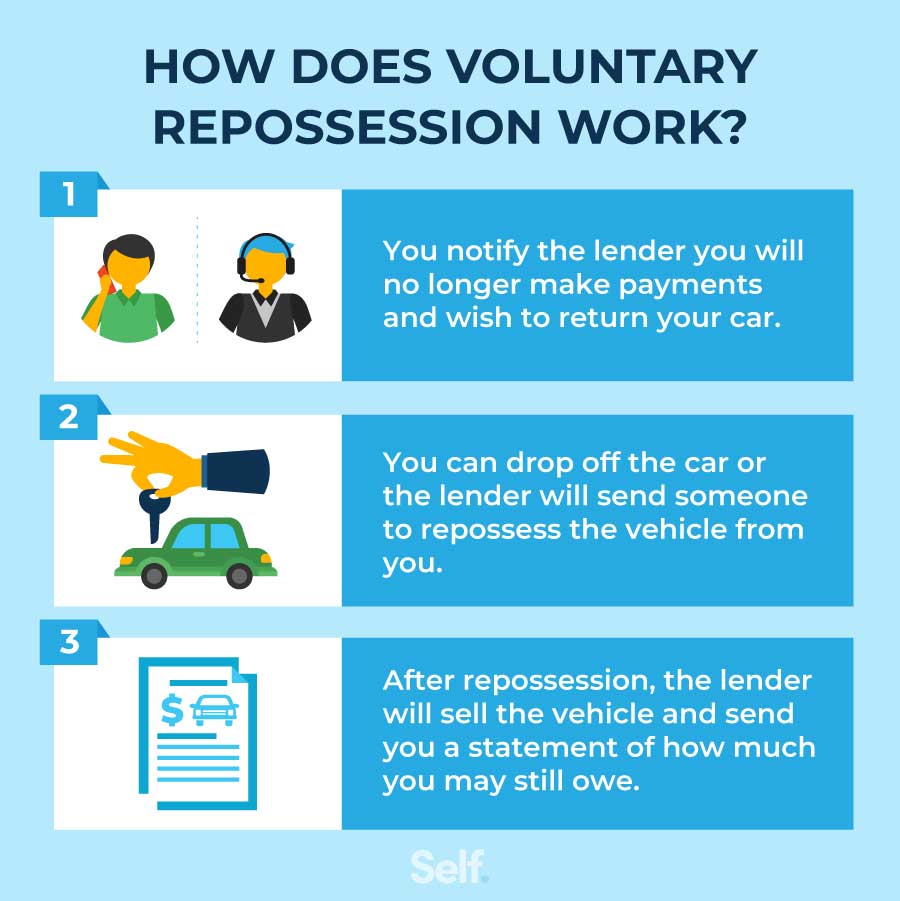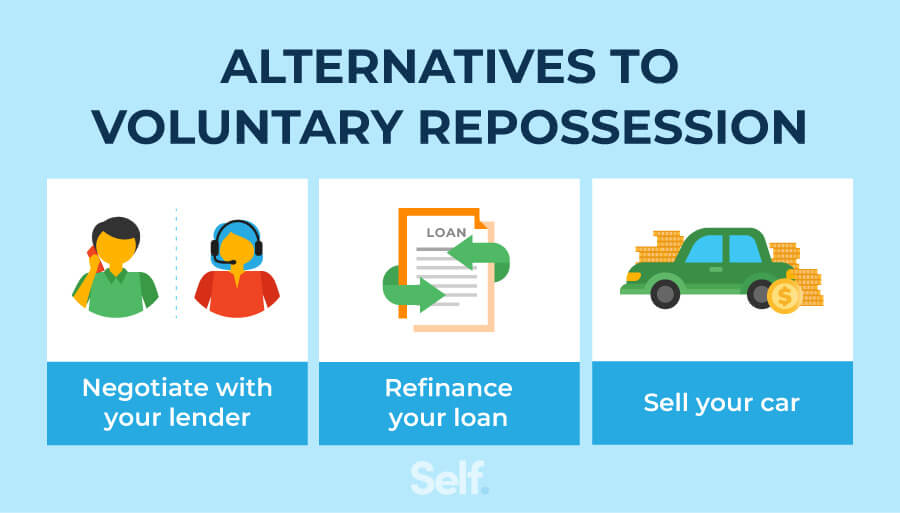How Voluntary Repossession Impacts Your Credit
Published on: 07/01/2022
A voluntary repossession, also called voluntary surrender, is one of two kinds of repossession that can occur if you can’t make your auto payments. The other is an involuntary repossession in which your lender forcibly takes your vehicle.
You initiate a voluntary repossession by reaching out to your lender and returning your car. The lender sells it and puts the money towards your outstanding balance. It’s important to understand that you may still owe money.
If you’re struggling to make auto payments, you may be considering voluntary repossession. However, make sure you understand the consequences and weigh the alternatives. A voluntary repossession can harm your credit and you may still owe an outstanding balance to your lender or a collection agency.
How does voluntary repossession work?

To initiate a voluntary repossession, contact your lender and tell them you’d like to surrender your vehicle. Choose a time and place to return your vehicle and keys. (This saves the lender from calling a tow truck to take possession of the car.) Make sure to document who you meet with, their contact information, and the date and time.
The creditor will resell your vehicle in an auction sale, with the auction proceeds going toward what you owe. You’ll then owe your balance minus what the car was sold for. This is known as the deficiency balance or shortfall.[1]
If you don’t pay the deficiency balance, the lender may be able to take you to court to seek a deficiency judgment. State laws differ: This can only occur in a state where deficiency judgments are recognized for auto loans and provided the vehicle was sold for a fair price. Deficiency judgments are most common for cases involving mortgage foreclosures.[2]
How voluntary repossession affects your credit
While it’s impossible to know precisely how much a repossession will affect your credit, you’ll likely see a significant decline. This is because your payment history is the largest single factor in determining your FICO® score, counting for 35%. Repossessions, like missed payments, fall into this category.
It may lower your credit score
Missed payments or late payments may cause your credit score to drop when you fall behind on your auto loan. If you’ve already missed car payments, your credit score has likely been affected. However, the consequences can be worse with a repossession because you’ve defaulted on your loan.
Debt sent to collections may also negatively impact your credit score. When lenders sell your debt to debt collectors, it’s known as a “charge-off,” and the collection account is reported separately on your credit report.
A default remains on your credit report for 7 years
A voluntary repossession is a loan default, which may harm your credit score and can remain part of your credit history for up-to seven years. That seven-year period begins from the date of the first missed payment that led to the default.
Even if your debt is sold to a collection agency, it’s treated as a continuation of your account with the original lender. If you owe a balance on your account and a court renders a judgment against you, you will not only have to pay, but your credit history may suffer. In fact, any court judgment against you in a lawsuit brought by a debt collector can also remain on your credit report for seven years, starting with the date of the judgment.[3]
It’s likely difficult to receive a new loan
Because a vehicle repossession affects your credit score, you may be less likely to get a new loan for a replacement vehicle — or other kinds of loans. If you are able to obtain a loan, lenders or dealerships are likely to charge you a higher interest rate because they may see you as a risk for defaulting on the loan.
Pros and cons of voluntary repossession
Voluntary surrender can help you in certain ways, but it won’t save you from some of the consequences of having your vehicle repossessed.
Pros of voluntary repossession
- If you choose to turn your vehicle back over to the lender voluntarily, it’s a more orderly process than a forced repossession.
- You won’t have to pay for the cost of towing or any other costs the lender may incur as part of the process.
- You’ll be able to retrieve any personal property from your car because you’ll be the one delivering it to the lender at a mutually agreed-upon time.
Cons of voluntary repossession
- You may owe a deficiency balance whether the repossession is voluntary or involuntary. Once your car is repossessed it will be sold at auction. If the car is auctioned for less than you owe, you are responsible for the balance.
- If you can’t pay the difference, the creditor may take you to court and obtain a judgment to garnish your wages. Some states do not allow wage garnishment, so make sure to check your state laws.
- A car repossession will have a negative impact on your credit score, and can stay on your credit report for seven years.[4]
Alternatives to voluntary repossession

Repossession is typically a last resort. It costs you money, credit, and, of course, the use of a vehicle you may need for transportation to and from work. In light of the consequences of any repossession — voluntary or forced — it’s worth exploring alternatives.
Negotiate with your lender
The first step should be contacting your auto lender, dealership, or financial institution to help manage your loan. Your lender may be willing to negotiate a new payment plan. Extending the terms of your loan could leave you with smaller monthly payments, but it could increase the amount of interest you pay.
Explaining your situation and reiterating your willingness to work toward repaying the loan may persuade the lender to help you come up with a plan that benefits you both.
Refinance your loan
You may want to see whether you qualify for a lower interest rate or an extension on a repayment period. Alternatively, you could explore debt consolidation by taking out a new loan that you use to pay off your vehicle loan along with other debts you owe.
Debt consolidation can simplify your debts by combining them into a single monthly payment. It can make your debt more manageable and help you improve your payment history, but depending on your individual credit history, it can also affect your credit score negatively by reducing the average age of your accounts, which counts for 15% of your FICO score.
Sell your car
If your loan payment is more than you can afford, you may want to consider selling your car, especially if your vehicle has high resale value. Check resources like Kelly Blue Book to understand what your car is worth.
You should also talk to your lender because they own the car title until you pay your remaining balance. If you cannot pay the balance, along with any fees, penalties, and interest, the lender may not agree to transfer the title. This is why it’s important to understand if your car is worth enough to cover the loan balance and any related fees.
Is it possible to get a voluntary repossession removed from your credit report history?
You can only remove inaccurate information from your credit report, so if your vehicle has been repossessed and reported to the three major credit bureaus, it can remain on your credit history for up-to seven years.
Whether your car is repossessed or you can’t continue to make loan payments on your car loan, your credit is likely to suffer. Although most negative marks remain on your credit report for seven years, they count for less the older they get. Meanwhile, you can work on rebuilding your credit so you can improve your personal finance and, in time, qualify for a new vehicle loan at a reasonable rate.
Sources
- Investopedia. “Deficiency Balance,” https://www.investopedia.com/terms/d/deficiency-balance.asp. Accessed February 20, 2022.
- Cornell Law School. “Deficiency Judgment,” https://www.law.cornell.edu/wex/deficiency_judgment. Accessed February 20, 2022.
- Experian. “Repossession and Voluntary Surrender on Credit Report,” https://www.experian.com/blogs/ask-experian/repossession-or-voluntary-surrender-will-remain-for-seven-years/. Accessed February 20, 2022.
- Experian. “How Does a Repossession Affect Your Credit?,” https://www.experian.com/blogs/ask-experian/how-does-a-repossession-affect-your-credit/. Accessed June 27, 2022.
About the author
Ana Gonzalez-Ribeiro, MBA, AFC® is an Accredited Financial Counselor® and a Bilingual Personal Finance Writer and Educator dedicated to helping populations that need financial literacy and counseling. Her informative articles have been published in various news outlets and websites including Huffington Post, Fidelity, Fox Business News, MSN and Yahoo Finance. She also founded the personal financial and motivational site www.AcetheJourney.com and translated into Spanish the book, Financial Advice for Blue Collar America by Kathryn B. Hauer, CFP. Ana teaches Spanish or English personal finance courses on behalf of the W!SE (Working In Support of Education) program has taught workshops for nonprofits in NYC.
